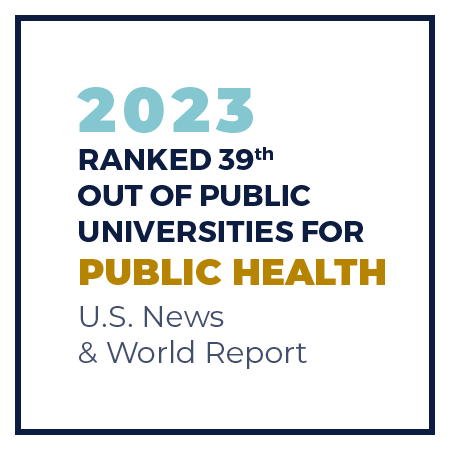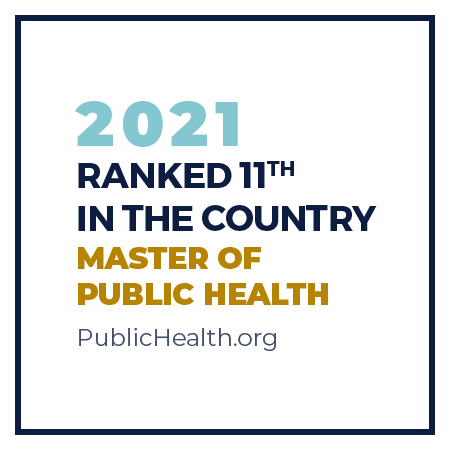Overview
Devise new ways to accomplish better living for people with FIU Online’s Master of Public Health (MPH) degree—one of the most respected and best MPH programs in the nation from a top-tier, public research institution with the highest Carnegie classification for Institutions of Higher Education. The MPH program will prepare students for interdisciplinary public health careers that investigate the epidemiology or distribution of diseases, as well as social and environmental determinants of health among diverse populations, locally or globally. Students will also learn about environmental health and safety and how to use existing health policies to make a difference as they influence policy development in support of optimizing population health. With the online master’s in public health program, Florida International University also showcases the diverse pool of our faculty who work at the forefront of research, scholarship and programming in public health—our students learn from experts.
This MPH degree is a program of distinction among public health master’s programs as it is the only generalist MPH online program offered in South Florida under the Florida State University System (SUS). It is affordable, flexible and tailored to the students’ needs and interests. Our faculty are locally accessible if students need to meet them in person for guidance to facilitate timely graduation or course selection.


-
Why Apply?
Graduates need the well-rounded education our MPH program provides to adequately address today’s public health needs. Our program’s strategic balance between coursework, lab research and practice delivers the perfect platform for both practitioners looking to sharpen their skills and scholars gearing up for cutting-edge research for a successful public health career. The FIU Online MPH degree, offered through The Robert Stempel College of Public Health & Social Work, is accredited by The Council on Education for Public Health (CEPH). FIU is a top-tier, urban, public research university in South Florida that offers one of the best MPH programs in the nation. As with any MPH program, advancing your education demands dedication and guidance. The MPH online degree in Public Health is a catalyst for professional advancement.
Prepare yourself to become a professional in an array of areas that support the health of the public as this program enhances the skills and qualifications of professionals working in the healthcare sector. Of note, physicians, dentists and other health practitioners are increasingly obtaining an MPH to enhance their professional careers, and to better participate in a rapidly changing healthcare environment. The reason for this is because there is a growing need for public health professionals. Growth in the public health arena can be attributed in part to a rise in the elderly population, efforts to improve health outcomes, and a focus on reducing healthcare costs by increasing education of healthy habits and maximizing the utilization of available healthcare resources (U.S. Bureau of Labor Statistics, 2016). For example, overall employment of health educators and community health workers is projected to grow 16 percent from 2016 to 2026, much faster than the average (seven percent) for all occupations. Graduates who secure positions in the public health field will shape the future of the health sector. Today’s professionals are driving change as they stimulate growth within the public health arena through improved health outcomes, a reduction of healthcare costs and by teaching people healthy behaviors and explaining how to use available healthcare services.
Students can expect to obtain transformational careers with a student-centered approach that include:
-
Opportunities to work closely with extraordinary faculty, irrespective of geography
-
Flexible schedules for full-time and part-time learning
-
Accommodations for working professionals pursuing a graduate degree while employed
-
FIU’s Master of Public Health program is fully accredited by the Council on Education for Public Health
-
Public health education complements all health profession degrees
-
National linkages to facilitate successful practicum experiences wherever you are located
-
-
Courses
Program Requirements
FIU Online’s Master of Public Health requires completion of 45 credit hours of approved coursework with a minimum of a ‘B’ (3.0) average. Public Health Core courses must be passed with a grade of ‘B’ or higher. All work applicable to the degree must be completed within six years of first enrollment in the master’s program.
Public Health Core Courses: (15 credits)
Five courses (3-credits per course) are to be selected to reflect the Online MPH competency-based objectives that allows the learning outcome in the integration of interdisciplinary public health programs.
PHC 6000 Introduction to Public Health Epidemiology
PHC 6102 Introduction to Public Health Policy and Management
PHC 6410 Health Behavior and Public Health
PHC 6315 Introduction to Environmental Health Sciences
PHC 6052 Public Health Statistics
Online General Core Courses: (15 credits)
Five courses (3-credits per course) are to be selected to reflect the Online MPH competency-based objectives that allows the learning outcome in the integration of interdisciplinary public health programs.
PHC 6055 Data Management and Applied Epidemiologic Analysis
PHC 6113 Community Health Promotion Planning and Research
PHC 6536 Health Demography
PHC 6104 Public Health Management and Leadership
PHC 6600 Health Promotion Communication
Elective Courses (9 credits)
Students are required to take three courses (3-credits per course) for 9-credits of the following advised graduate public health electives. Students may take any other faculty approved 6000 level courses in the college to meet the 9-credit requirement. For MPH, course descriptions please visit the catalog.
PHC 6355 Environmental Health and Safety
PHC 6374 Environmental Disasters
PHC 6009 AIDS Epidemology
PHC 6412 Health Promotion in Culturally Diverse Communities
Practicum and Culminating Experience: (6 credits)
PHC 6945 Practicum in Public Health (200 hours of practicum)
PHC 6930C Integrative Seminar in Public Health
PHC 6945 (practicum) and PHC 6930C (culminating experience) are both required for all online MPH students. The practicum may be taken after completing a minimum of 30 credit hours, including all core courses. Students must contact the program at least two semesters prior to registering for the practicum to begin the process of planning, respective to the geographic location of the student and intended project. The practicum may be waived if the student has at least three years of relevant practice experience working in a public health practice setting. The waiver request is prepared by the student and submitted to the program for final approval. If the practicum requirement is waived, the student will need to substitute an approved 3-credit course in place of PHC 6945 (practicum) such that the total curriculum hour requirement of 45 credit hours is met.
-
Requirements
Admission Requirements
Applicants must meet the university’s general graduate admission requirements. Students with diverse backgrounds are encouraged to apply.
- A bachelor’s degree or equivalent from a regionally accredited U.S. college or university.
- International applicants must have a WES-verified institution and also recognized in its own country as preparing students for further study at the graduate level.
- A minimum 3.0 GPA in the last 60 credits of upper-level undergraduate coursework.
International Students
-
Proof of English Language Proficiency. If you earned a bachelor's degree in a country whose official language is not English, you must demonstrate English language proficiency by earning a passing score on the Test of English as a Foreign Language (TOEFL) or the International English Language Testing System (IELTS). TOEFL required minimum score: 550 (paper-based exam) or 80 (internet-based). IELTS required minimum score: 6.5. When requesting official scores, please refer to FIU Institution code 5206. TOEFL / IELTS scores are valid for two years. View list of TOEFL/IELTS-exempt countries.
-
Graduate programs can use the Duolingo English Test.
-
Please visit Duolingo English Test for more information about how to register for the exam.
-
FIU Minimum Duolingo English Test Score: 110
-
-
Course by Course Evaluation. If your post-secondary educational history includes coursework outside the United States, you must submit a course-by-course credential translation and evaluation, with grade point average (GPA) calculation included, for all non-U.S. coursework. FIU accepts evaluations/translations from any NACES member evaluation service.
FIU accepts evaluations/translations from any NACES member evaluation services, below are a few FIU recommends:
Josef Silny & Associates, Inc., International Education Consultants
World Education Services
7101 SW 102 Avenue
Miami, FL 33173
Phone: 305-273-1616 | Fax 305-273-1338
www.jsilny.org | info@jsilny.com
Visit the Josef Silny & Associates FIU Form for details
PO Box 745
New York, NY 10113-0745
212-966-6311
www.wes.org | info@wes.org
Educational Credential Evaluators, Inc.
PO Box 514070
Milwaukee, WI 53203-3470
414-289-3400 | www.ece.org
-
Official Transcripts Translation. If official transcripts are not in English, a second copy of the transcript must be requested for translation. Both the official translation, as well as the original transcripts, must be submitted to FIU.
-
Certified Copy of Diploma. If you obtained your degree at a foreign institution.
- As a fully online degree, this program is ineligible to grant/provide F-1 Student visas.
Admissions Documents
The following must be submitted:
- Complete the SOPHAS application form.
- A current resume. Uploaded to SOPHAS. Include education, training, and employment history, practical and research experience (such as projects and publications), skills and other pertinent information.
- A written statement of purpose. Uploaded to SOPHAS. Statement must clearly state his/her intended career goals, in addition to other information.
- Three letters of recommendation must be sent. Uploaded to SOPHAS. Letters are to be from those who have knowledge of the applicant's prior professional experience (e.g. a supervisor) or of the applicant's ability to perform graduate work (e.g., a professor) and should attest to the applicant's intellectual ability, motivation, maturity, and potential.
- No GRE Requirement
- Official university/college transcripts from all institutions previously attended – for additional instructions, please click here.
- FIU Graduate Admissions Supplemental Application – please click here to access.
Meeting the minimum admission requirements does not guarantee admission into the program. Official transcripts/translations must be submitted directly by the respective institution(s) in electronic format or mailed in a sealed institution envelope to:
Florida International University
Office of Graduate Admissions
P.O. Box 659004
Miami, FL 33265-9003 -
Tuition
Pursuing your degree is one of the best investments you can make — one that will open doors to personal and professional opportunities. Our tuition costs represent some of the best value in higher education, and we also offer financial aid support to reach your goals.
Scholarship opportunities available
Academic Works
FIU offers Academic Works, a website that matches students with relevant scholarship opportunities. Find the one that’s right for you! Academic Works is an online scholarship application tool where FIU students can browse and apply for more than 100 scholarships, made possible by the generosity of FIU alumni and friends. Students can apply after they are matriculated into one of our programs. For more information visit https://give.fiu.edu/business-governance/scholarships/.
Other Resources
There are other third party resources that prospective students can access while researching on how to pay for school. Below are various links that provide more information on financial aid and scholarship opportunities:
Federal Financial Aid
For information on Federal Financial Aid and the Free Application for Federal Student Aid (FAFSA), please visit our financial aid page.
Under the revised Florida Board of Governors' (BOG) Regulation 8.002, all institutions of the State University System (SUS) of Florida are required to provide students with a side-by-side Tuition and Fees comparison for continuing education programs. The tuition comparisons are made between a traditional program vs. its counterpart Market Rate/Self-Supporting program. This approach provides students an opportunity to become aware of options that are available upon selecting a degree program of study.
Please click on the following link which will take you to a searchable database that provides the side-by-side tuition and fees comparisons for the Master of Public Health: https://continue.fiu.edu/programs/side-by-side-tuition-comparison/embed.html
-
Top Faculty
Stempel College is home to groundbreaking research programs and centers fueled by faculty, staff and students who parse problems to find answers at an accelerated pace. We research and teach to affect positive change for the health of communities through interventions at every possible level. Our research guides leaders, is translated into policy and processes, and ultimately, serves those who need the most support.
Our faculty members are well-respected scholars, practitioners, and experts in many areas of public health; all share a common goal of inspiring and mentoring students to best facilitate the process of learning. Faculty members are dedicated to empowering students to become leaders in their chosen fields.

Changwoon Yoo
Dr. Changwon Yoo’s research, teaching, and service activities are shaped by three common aims: examining and developing novel computational and statistical methods, providing useful insights in improving health outcomes of the public in general, and involving a collaborative partnership of university, community agencies and organizations, and residents to achieve the first two aims. The incorporation of these aims into all levels of his scholarship (research, teaching, service) provides cohesiveness to his work, which enables him to be more efficient, effective, and productive. Dr. Yoo’s research focuses on developing and disseminating innovative statistical methods for Big Data Analytics (BDA). His research draws from statistical machine learning, genomics, and neuroscience and seeks to identify and build statistical methods in big data such as genomics, proteomics, neuroimaging and clinical data. It is highly collaborative because understanding disease mechanisms and coming up with better treatments and prevention in medicine and public health inevitably involve analyzing complex and big data. He is currently a principal investigator in a National Institutes of Health (NIH) grant to build a novel computational causal model of key genes interactions in brain cancer development.
Alok Deoraj
Dr. Alok Deoraj has extensive teaching, research and management experience in academic and industry settings. His current primary focus is on teaching undergraduate, graduate and PhD students. Dr. Deoraj conducts research in the area of environmental toxicology to investigate the influence of complex environmental exposures on the neuroendocrine regulation (e.g., via Kisseptin, GABA and other neuropeptides) of Gonadotropin-releasing Hormone-II (GnRH-II) release and its downstream signaling on the timing of the onset of the puberty/adolescence. He is interested in finding whether timing of puberty is a risk factor for reproductive cancer and/or neurodegenerative diseases. His research may lead to identify exposome(s), environmental and epigenetic biomarkers which can be applied to conduct environmental health risk assessment for reproductive aging/cancer and neurodegenerative disorders.
Quentin Felty
Dr. Quentin Felty received a doctorate in environmental health sciences from the University of Alabama at Birmingham School of Public Health where he was a National Cancer Institute Cancer Prevention and Control Training Program fellow. His ongoing research is focused on understanding the molecular mechanism of susceptibility to estrogenic chemical associated vascular cell dysfunction resulting in obliterative intimal lesions in the pulmonary arteries of pulmonary arterial hypertension (PAH) patients.In addition, he also studies the role of deviant endothelial stem cells in the spread of breast cancer. Dr. Felty’s laboratory uses state-of-the-art approaches to understand the impact of estrogenic chemicals on the Inhibitor of Differentiation protein 3 (ID3). His areas of research consist of identifying a biological based mechanism by which elevated exposure to complex mixtures of endocrine disrupting chemicals promote vascular cell dysfunction and its implications to brain vascular health, pulmonary vascular health, and the metastatic spread of cancer stem cells, as well as developing novel 3D human blood-brain barrier tissue culture to study gene-environment effects on aging and identifying novel redox signaling molecules involved in the maintenance of vascular stem cells and its application to aging.
Vukosava Pekovic
Dr. Vukosava Pekovic is the MPH program director and clinical Associate professor in the Department of Epidemiology. She directed programs in the Institute of Public Health of Serbia (prevention and control of communicable and non-communicable diseases; health needs and services assessment), and the Miami-Dade County Health Department (childhood lead poisoning prevention and bio-terrorism preparedness programs).In addition to teaching, she is involved in MPH practicum oversight, accreditation, and advising for the Stempel Public Health Association and epidemiology students. Her research includes adolescent health behavior in Serbia, TB prevention and patient compliance in sub-Saharan Africa, lead poisoning among immigrant children in Miami, FL, disaster planning for older adults and the health needs of elders.

Diana Sheehan
Diana Sheehan is an Assistant Professor in the Department of Epidemiology at Florida International University (FIU). Her research focuses on identifying gaps and improving outcomes along the HIV care continuum, particularly for Latinos living with HIV in the United States and Latin America. Currently, Dr. Sheehan is leading an ecological momentary assessment (EMA) study that examines antiretroviral therapy adherence and the feasibility of a related Just-In-Time Adaptive Intervention (JITAI) among Latino men who have sex with men. Dr. Sheehan’s work has been funded by the National Institute on Drug Abuse (NIDA), the National Institute on Minority Health and Health Disparities (NIMHD), the HIV Prevention Trials Network (HPTN), and the Robert Wood Johnson Foundation. Additionally, Dr. Sheehan is dedicated to advancing the research careers of minority investigators, both as a faculty under the FIU-Health Disparities Initiative (FIU-HDI) and as a co-investigator on the FIU Center for Reducing Health Disparities in Substance Abuse & HIV in South Florida (FIU-RCMI).
Berthline R. Isma
Dr. Berthline Isma is a visiting professor in the Department of Epidemiology at Florida International University, Robert Stempel College of Public Health and Social Work. Dr. Isma holds a PhD degree in Public Health with a concentration in Epidemiology, Master of Science in public health (MPH), Master of Business Administration (MBA), and a B.S. in Biology (Pre-Med).Coupled with her academic credentials, Dr. Isma brings a wealth of knowledge and experience in the field of HealthCare. She has over twelve years of hands-on experience in the field of HealthCare, Strategic Planning, STD/TB and HIV/AIDS. Dr. Isma is certified by the State of Florida as an Environmental Public Health (CEPH).
Her activism is guided by the passion to help people who are disenfranchised not only in the USA, but also around the world. Her passion has led to the founding of Impact on the World Through HealthCare (IWTHC), a non-profit organization aimed at providing access to much needed health care services and helping people around the world by increasing awareness to STDs, HIV/AIDS and some chronic diseases. Her research interest is primarily focused on health disparities among racial and ethnic minorities and the underserved population in the U.S. and internationally.
She is an abstract and film reviewer for several Public Health Conference panels.

Jessica L. Adler
Dr. Jessica L. Adler, assistant professor of history and health policy and management at Florida International University, researches and teaches about U.S. health and social policy, war and society and American political development. Her first book, Burdens of War: Creating the United States Veterans Health System (Johns Hopkins University Press, 2017), is about the World War I-era origins of the nation’s largest integrated health care system. She continues to focus on federal involvement in health care in her current projects, which examine the history of medical services in U.S. correctional institutions and transformations in the late twentieth century veterans’ health program. Adler’s research has appeared in The American Journal of Public Health and the Journal of the History of Medicine and Allied Sciences and she has composed book chapters for edited volumes on military and medical history. She has also written pieces for The Washington Post, The Hill, The Miami Herald and USA Today. A winner of the 2013 Columbia University Bancroft Dissertation Award, her work has been supported by the National Endowment for the Humanities, the Florida Humanities Council, the FIU Office of the Provost Humanities Research Initiative, the Doris G. Quinn Foundation, the Institute for Political History and the U.S. Army Military History Institute.
Rashida Biggs
Dr. Rashida Biggs is a certified health education specialist who has been working in the health care field for over 15 years. Dr. Biggs received both a bachelor’s in liberal arts and biology and a master’s degree in public health from Florida International University. Additionally, she obtained her doctorate in health science from Nova Southeastern University.Dr. Biggs has many years of practical experience developing and managing health promotion/disease programs implemented at community health centers in Collier, Broward, and Dade counties. Additionally, Dr. Biggs also has several years of group practice management. Due to Dr. Biggs’ extensive background in program development, management, and evaluation, she was called upon to provide technical assistance in program planning and execution by the Centers for Disease Control and Prevention, Miami-Dade County’s Department of Health and the Public Health Trust.
Dr. Biggs has participated in research at various levels. She has experience conducting research for Phase II-IV HIV clinical trials. More recently, Dr. Biggs facilitated community‐based participatory research and intervention efforts to reduce chronic disease disparities in minority and underserved communities in South Florida.
Dr. Biggs continues to participate in community-based participatory research with communities in South Florida as well as the Caribbean, with a focus on sexual negotiation and childhood obesity.

Elena Sebekos
Dr. Elena Sebekos is an Instructor in the Department of Health Promotion and Disease Prevention at Florida International University’s (FIU) Robert Stempel College of Public Health and Social Work. She is a Certified Health Education Specialist (CHES) with experience in developing, implementing, and evaluating diverse public health projects, questionnaire development, and data collection, management, and analysis. Her research includes strategic communications to prevent HIV infections among Black and Hispanic young adults, risky sexual behavior among diverse college students, and health and academic success of university students.In addition to teaching undergraduate and graduate courses, Dr. Sebekos helps oversee the doctoral program in Health Promotion and Disease Prevention and advises MPH students.
-
View our Information Session
Learn more about the details of our program by listening in to our information session.
45 Credits Required
$600.00 Tuition Cost Per Credit Hour (All Courses Are 3 Credit Hours)
* Total tuition and fees are subject to change.
Highlights
Can be completed in as little as one year, three semesters
Accredited by The Council on Education for Public Health (CEPH)
No GRE Requirement
Option to earn a Certificate in Epidemiology or Environmental Health Sciences with minimal additional course requirements.
This program grants you access to Career Engage and associated scholarships.
#11 in the country for the Best Online Programs, PublicHealth.org, 2021



